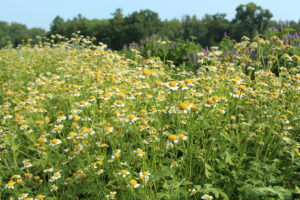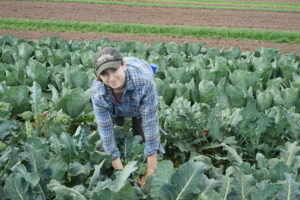Farms are shaped as much by the interests of individual farmers as they are by climate and soil. The Farm Hub is offering farmer trainees the opportunity to pursue these interests while still in training in a supportive environment. As a ProFarmer completes year-one of the program, he or she works with staff to design an individual project for the following season that focuses on a specific crop as a complement to the cohort-oriented farmer training curriculum. During the 2017 season, second year ProFarmer Jess Clancy established a medicinal herb garden on half an acre of Farm Hub land.
Clancy, who grew up outside Chicago, has a background in chemistry and an interest in medicinal botany, and says she’s had a “farm dream” in the back of her mind since her very first experience working on an organic farm. Prior to joining the Farm Hub in 2016, Clancy attended the Michael Fields Agricultural Institute in Wisconsin and worked at organic farms and farmers’ markets in Wisconsin and Massachusetts, as well as in the Hudson Valley at Fishkill Farms, where she oversaw 15 acres of organic vegetable production.
For her project, Clancy was inspired by Zack Woods Herb Farm in Hyde Park, Vermont, which provides certified organically grown or ethically harvested fresh and dried botanicals and herbal teas. Clancy was also inspired by Healing Spirits Farm, a biodynamic and certified organically grown herb farm located near Avoca, in the Finger Lakes region, which produces fresh and dried medicinal herbs and teas, tinctures, salves, creams, infused oils and liniment, and flower essences.
Clancy’s medicinal herb garden features 35 herb varieties, including species such as nettles, holy basil, and blue vervain. Clancy planned for the project by researching what is being grown in the region and considering which herbs would grow well and be marketable. She discovered a small but growing local market for herbal products—including beverages, teas, bitters, and tinctures. She also found that some local businesses require herbs for their products but lack both the room to grow herbs on-site and the facilities for the processing and complex testing that herbs require. For this reason, producers often look to source herbs from specialized growers.
Over the course of the season, Clancy tracked a variety of costs—including labor, materials, and yield—in an effort to evaluate the feasibility of growing herbs as part of a future farm enterprise.
So far, Clancy says she has found that herb farming can be unpredictable, but she is optimistic. As the 2018 season gets underway, she is now planning on narrowing down her range of herbs to grow larger quantities of a few in-demand varieties.
For more information about the Profarmer program and current trainees, see here.


